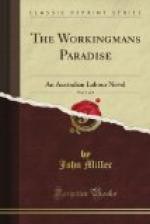“Other nations have literature,” maintained Connie.
“What other living nations?” demanded Geisner. “Look at English! An endless list, such as surely before the world never saw. You cannot even name them all. Spencer and Chaucer living still. Shakespeare, whoever he was, immortal for all time, dimming like a noontide sun a galaxy of stars that to other nations would be suns indeed! Take Marlow, Beaumont and Fletcher, a dozen playwrights! The Bible, an imperishable monument of the people’s English! Milton, Bunyan and Baxter, Wycherly and his fellows! Pope, Ben Johnson, Swift, Goldsmith, Junius, Burke, Sheridan! Scott and Byron, De Quincey, Shelley, Lamb, Chatterton! Moors and Burns wrote in English too! Look at Wordsworth, Dickens, George Eliott, Swinburne, Tennyson, the Brontes! There are gems upon gems in the second class writers, books that in other countries would make the writer immortal. Over the sea, in America, Poe, Whittier, Bret Harte, Longfellow, Emerson, Whitman. Here in Australia, the seed springing up! Even in South Africa, that Olive Schreiner writing like one inspired. By heavens! There are moments when I feel it must be a proud thing to be an Englishman.”
“Bravo, Geisner! You actually make me for the minute,” cried Ford.
“You should be! Has any other people anything to compare? There is not one other whose great writers could not almost be counted on the fingers of one hand. Spain has Cervantes and he is always being thrown at us. Germany has Goethe, Heine, Schiller. France so seldom sees literary genius that a man like Victor Hugo sends her into hysterics of self-admiration. But I’m afraid I’m lecturing.”
“It’s all right, Geisner,” remarked Connie. “It’s not only what you say but how you say it. But what are you driving at?”
“Just this! Nations seldom do all things with equal vigour and fervour and opportunity, so one excels another and is itself excelled. England excels in the simplest and strongest form of expression, literature. She is defective in other forms and borrows from us. But so we others borrow from her. Puritanism did not crush English art. English art, in the national way of expressing the national feeling, kept steadily on.”
“Thanks! I think I’ll sit down,” he added, as Stratton handed him a tumbler half-filled with wine and a water-bottle. He filled the tumbler from the bottle, put them on the table, took cigarettes in a case from his pocket and lighted one at a gas jet behind him.
“Do you take water with your wine?” asked Stratton of Ned.
“I don’t take wine at all, thank you,” said Ned.
“What!” exclaimed Connie, sitting up. “You don’t smoke and you don’t drink wine. Why, you are a regular Arab. But you must have something. Arty! Rouse up and light the little stove again! You’ll have some tea, Ned. Oh! It’s no trouble. Arty will make it for me and it will do him good. What do you think of this oration of Geisner’s?”




